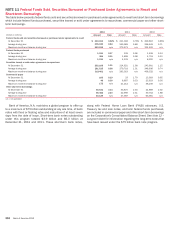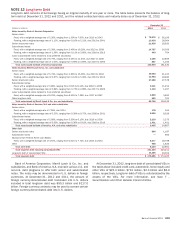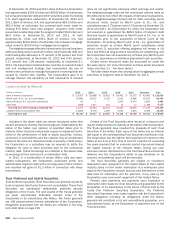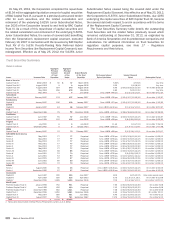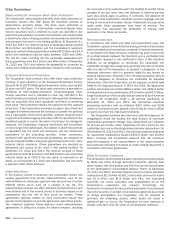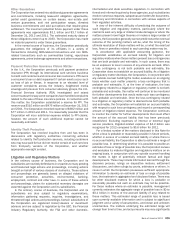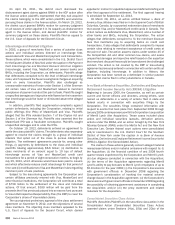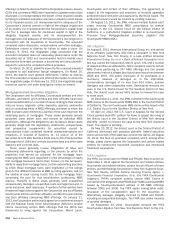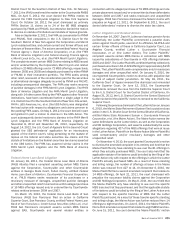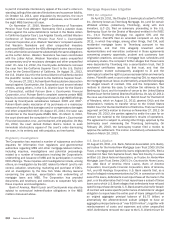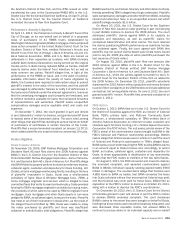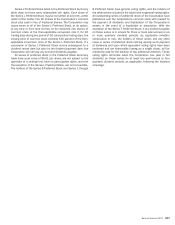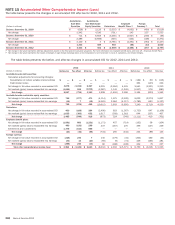Bank of America 2012 Annual Report Download - page 230
Download and view the complete annual report
Please find page 230 of the 2012 Bank of America annual report below. You can navigate through the pages in the report by either clicking on the pages listed below, or by using the keyword search tool below to find specific information within the annual report.228 Bank of America 2012
On April 19, 2011, the district court dismissed the
disbursement agent claims against BANA in the ACP action after
the Avenue action plaintiffs represented that they had acquired
the claims belonging to the ACP action plaintiffs and would be
pursuing those claims in the Avenue action. On March 19, 2012,
the district court granted BANA’s motion for summary judgment
on all causes of action against it in its capacity as disbursement
agent in the Avenue Action, and denied plaintiffs’ motion for
summary judgment on those claims. Plaintiffs filed an appeal to
the U.S. Court of Appeals for the Eleventh Circuit.
Interchange and Related Litigation
In 2005, a group of merchants filed a series of putative class
actions and individual actions directed at interchange fees
associated with Visa and MasterCard payment card transactions.
These actions, which were consolidated in the U.S. District Court
for the Eastern District of New York under the caption In Re Payment
Card Interchange Fee and Merchant Discount Anti-Trust Litigation
(Interchange), named Visa, MasterCard and several banks and
BHCs, including the Corporation, as defendants. Plaintiffs allege
that defendants conspired to fix the level of default interchange
rates, which represent the fee an issuing bank charges an acquiring
bank on every transaction. Plaintiffs also challenged as
unreasonable restraints of trade under Section 1 of the Sherman
Act certain rules of Visa and MasterCard related to merchant
acceptance of payment cards at the point of sale. Plaintiffs sought
unspecified damages and injunctive relief based on their assertion
that interchange would be lower or eliminated absent the alleged
conduct.
In addition, plaintiffs filed supplemental complaints against
certain defendants, including the Corporation, relating to initial
public offerings (the IPOs) of MasterCard and Visa. Plaintiffs
alleged that the IPOs violated Section 7 of the Clayton Act and
Section 1 of the Sherman Act. Plaintiffs also asserted that the
MasterCard IPO was a fraudulent conveyance. Plaintiffs sought
unspecified damages and to undo the IPOs.
On October 19, 2012, defendants entered an agreement to
settle the class plaintiffs’ claims. The defendants also separately
agreed to resolve the claims brought by a group of individual
retailers that opted out of the class to pursue independent
litigation. The settlement agreements provide for, among other
things, (i) payments by defendants to the class and individual
plaintiffs totaling approximately $6.6 billion; (ii) distribution to
class merchants of an amount equal to 10 bps of default
interchange across all Visa and MasterCard credit card
transactions for a period of eight consecutive months, to begin by
July 29, 2013, which otherwise would have been paid to issuers
and which effectively reduces credit interchange for that period of
time; and (iii) modifications to Visa and MasterCard rules regarding
merchant point of sale practices.
Subject to the loss-sharing agreements the Corporation and
certain affiliates previously entered with Visa, MasterCard and
other financial institutions, the Corporation will contribute a total
of $738 million to the settlement of the class and individual
actions. Of that amount, $539 million will be paid from the
proceeds that Visa previously placed into an escrow fund pursuant
to Visa’s Retrospective Responsibility Plan (the RRP) to cover the
Corporation’s share of Visa-related claims.
The court granted preliminary approval of the class settlement
agreement on November 9, 2012, over the objections of several
class members. The objecting class members appealed to the
U.S. Court of Appeals for the Second Circuit, which denied
appellants’ motion for expedited appeal and deferred briefing until
after final approval of the settlement. The final approval hearing
is scheduled for September 12, 2013.
On March 28, 2011, an action entitled Watson v. Bank of
America Corp. (Watson) was filed on in the Supreme Court of British
Columbia, Canada, by a purported nationwide class of merchants
that accept Visa and/or MasterCard credit cards in Canada. The
action names as defendants Visa, MasterCard, and a number of
other banks and BHCs, including the Corporation. The action
alleges that defendants conspired to fix the merchant discount
fees that merchants pay to acquiring banks on credit card
transactions. It also alleges that defendants conspired to impose
certain rules relating to merchant acceptance of credit cards at
the point of sale. The action asserts claims under section 45 of
the Competition Act and other common law claims, and seeks
unspecified damages and injunctive relief based on the assertion
that merchant discount fees would be lower absent the challenged
conduct. The action is not covered by the RRP or loss-sharing
agreements previously entered in connection with certain antitrust
litigation, including Interchange. In addition to Watson, the
Corporation has been named as a defendant in similar putative
class action claims filed in other jurisdictions in Canada.
In re Bank of America Securities, Derivative and Employee
Retirement Income Security Act (ERISA) Litigation
Beginning in January 2009, the Corporation, as well as certain
current and former officers and directors, among others, were
named as defendants in a variety of actions filed in state and
federal courts in connection with securities filings by the
Corporation. The securities filings contained information with
respect to events that took place from September 2008 through
January 2009 contemporaneous with the Corporation’s acquisition
of Merrill Lynch (the Acquisition). These cases included class
action and individual securities lawsuits, derivative actions,
actions under the ERISA, and an action brought by the New York
Attorney General (NYAG) under the Martin Act and the New York
Executive Law. Certain federal court actions were consolidated
and/or coordinated in the U.S. District Court for the Southern
District of New York under the caption In re Bank of America
Securities, Derivative and Employee Retirement Income Security Act
(ERISA) Litigation (the Consolidated Action).
The claims in these actions generally concern alleged material
misrepresentations and/or material omissions with respect to: (i)
the Acquisition; (ii) the financial condition of and 2008 fourth-
quarter losses experienced by the Corporation and Merrill Lynch;
(iii) due diligence conducted in connection with the Acquisition;
(iv) the terms of the Acquisition agreements regarding Merrill
Lynch’s ability to pay bonuses to Merrill Lynch employees of up to
$5.8 billion for the year 2008; (v) the Corporation’s discussions
with government officials in December 2008 regarding the
Corporation’s consideration of invoking the material adverse
change clause in the Acquisition agreement; (vi) the Corporation’s
discussions with government officials in December 2008 regarding
the possibility of obtaining government assistance in completing
the Acquisition; and/or (vii) the proxy statement and related
materials for the Acquisition.
Consolidated Securities Class Action
Plaintiffs (Securities Plaintiffs) in the securities class action in the
Consolidated Action (Consolidated Securities Class Action)
asserted claims under Sections 14(a), 10(b) and 20(a) of the


